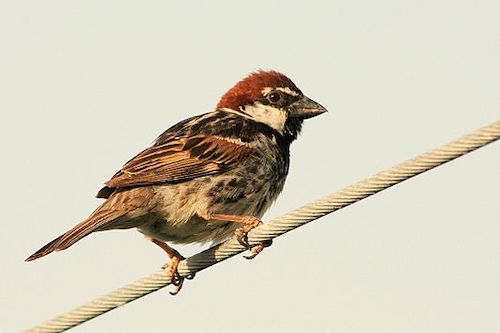(Spanish sparrow; photo: Wikipedia)
Sparrows prefer to live close to people. Their sober plumage will never inspire any hippie, even though their tones of grey, mauve and brown are arranged into a wonderful pattern — especially on the male sparrow. Along with being more beautiful than the female he also talks the most: chattering with the other fellows or bragging about how beautiful he is to the females.
The population of sparrows is quickly declining, but scientists do not know exactly why. The Chinese already know life without sparrows. In 1958 the communist dictator Mao Zedung wanted to reform China and ordered the battle to exterminate the 4 pests of the country: mosquitos, flies, rats and sparrows. Imagine this: one sparrow steals at least 2 kilo of grain a year. Millions of Chinese started chasing and killing sparrows. The Polish Embassy in Beijing however refused to kill the birds, making their garden a sparrow refuge. Eventually the Chinese surrounded the embassy with drums, producing such loud noises that the sparrows anxiously flew around until they were so tired, they dropped dead — leaving the embassy with a thick carpet of dead sparrows.
Mao Zedung had, however, forgotten that sparrows eat insects (who also love to eat grain). After the death of some billion sparrows, insects saw the chance in a lifetime to attack en masse the harvests. Killing sparrows was one of the causes of the ensuing huge famine: killing some 55 millions of Chinese (1959 – 1961). Eventually China had to import some 250.000 Russian sparrows to restore balance in nature.
In the Netherlands a great part of the population got pretty upset when only one house sparrow was murdered. This female sparrow caused the fall of 23,000 dominos who were ready to fall on Domino Day 2005. This so-called Domino sparrow’s reputation has been rehabilitated and she is now stuffed and might be the most famous sparrow in the world.
On Lesvos no Domino sparrows fly around, just some rock sparrows and mostly Spanish sparrows. These Spanish birds hibernate in Spain or Africa so I have no idea which sparrows are hiding in the bushes of Lesvos during the cold months. (Might be a migrating family from Holland, confusing the Spanish sun with the Greek one). I have previously described such a sparrow bush as a sexclub, where merry chattering little birds hop around excitingly amidst the thick foliage.*
Sparrows symbolize lots of happiness, like prosperity and welfare in Japan. In Greece it is love and fertility. Aphrodite, goddess of love, is often depicted with a sparrow. Even Sappho wrote in an ode to Aphrodite that busy fluttering sparrows pulled the chariot of Aphrodite**, when she set off to visit Sappho, after the poetess of Lesvos asked for her help in a matter of love.
Sparrows are no long-distance fliers. They more or less do ‘island hopping’, from tree to bush, to grass, to tree. They prefer to operate in groups, just to scare the cats who chase them. In spring they get a bit mad and organize big dance festivals for the young ones to look for a partner. Sparrows don’t line-dance, but are masters of simultaneous flight. Loud singing and clapping with their tiny wings they dance across the landscape. Like a game of musical chairs: when in hundreds and with lots of noise they fly into a tree, the one who doesn’t find an empty branch has lost. And then, ‘hoppa’, en masse they dive into the grass, looking for creamy seeds, where after loud howling they fly into another tree. Starling clouds are impressive, but clouds of dancing sparrows make you really happy.
Sparrows can be cheeky. They, for example, occupy the nests of swallows or even storks. But they are no racists and do not need telephones to communicate. They do defend their territory with loud voices, but never will go to war over that. When a female does not like the attention of a male, she says so loud and clearly. They do not need ‘me too’ because they can defend themselves.
For hours I can watch springing sparrow clouds and wonder why those happy looking birds with their simple life do like so much to live close to warlike humans with a quickly declining tolerance rate.
* See: A sparrow bush
** From Song 1, Ode to Aphrodite by Sappho (translated by Julie Dubnoff):
yoking your chariot of gold.
Then beautiful swift sparrows led you over the black earth
from the sky through the middle air,
whirling their wings into a blur.











